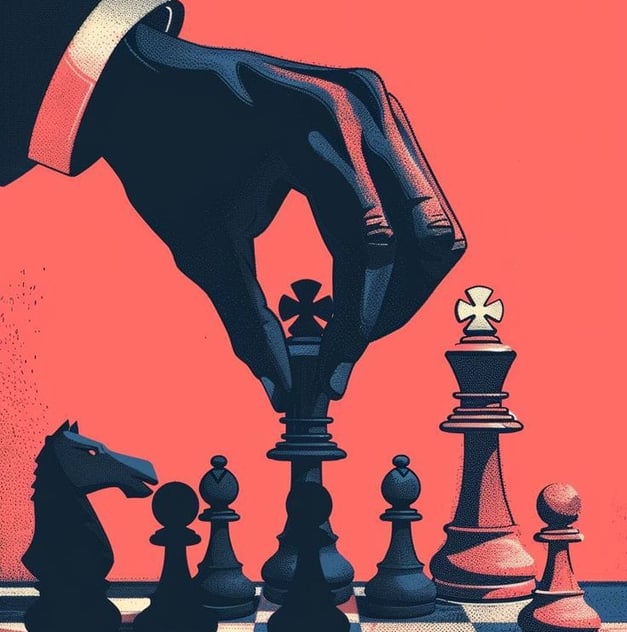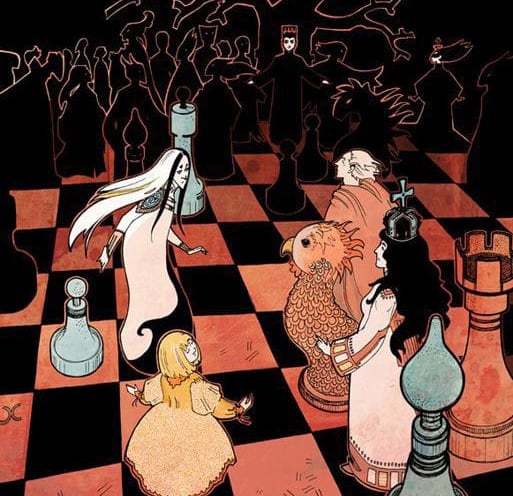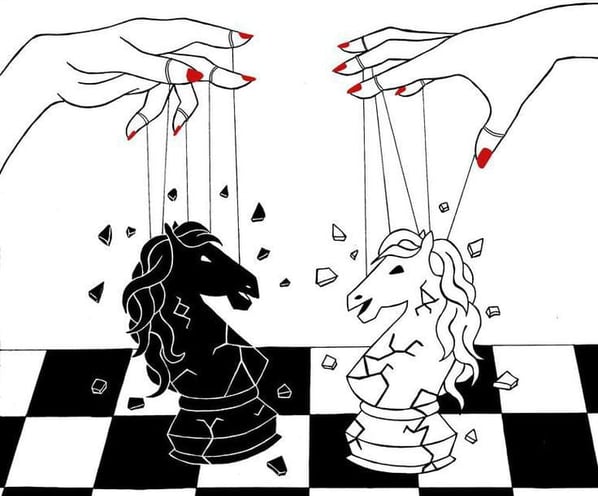Can we compare chess addiction to substance abuse or gaming addiction?
Does chess addiction even exist? This has been a discourse for quite some time now in addiction research and this blog explores the concept of chess addiction, examining the psychological mechanisms behind compulsive play, and its parallels with gaming and substance abuse addictions.
ADDICTION PSYCHOLOGY
Shivanshee Rathore
10 min read


Introduction: does the world of black and white have any space for grey?
In 2024, an 18-year-old Indian grandmaster, Dommaraju Gukesh, became the youngest undisputed world chess champion in history by winning his last match in Singapore against the reigning champion, Ding Liren (a Chinese grandmaster). This remarkable achievement has managed to enchant audiences worldwide and has reignited the discussions about chess's intellectual allure. Surprisingly, this is not the first time that chess talk made a comeback - with the release of Queen's Gambit (a series on chess) on Netflix, chess has gained a lot of transition once again in the main media. While all these stories tend to inspire, they also highlight the game's immersive and all-time-consuming nature.
The appeal of chess is undeniable. Blending strategies, creativity, and logic to predict moves is a challenging force in itself, however, for many enthusiasts, this fascination sometimes falls into obsession. This raises an intriguing question; can chess addiction be compared to other gaming or substance abuse addictions? Drawing from empirical evidence and psychological studies, this article will explore the nature of chess addiction - is it as harmful as other addictions as we know them or does it just share parallels with other addictive behaviors, and if individuals can cultivate a healthier relationship with this timeless game?
Image credit: Pinterest
Understanding Addiction: Substance Abuse, Gaming, and Chess
The American Psychological Association (APA, 2013) has defined addiction as a compulsive engagement in activities, despite their harmful nature or negative consequences, that changes the brain's reward systems. Usually, substance addiction is more focused on physical dependencies while behavioral addiction (gaming or gambling) is more concerned with psychological reinforcement. Chess addiction falls under the latter category where the thrill of winning repeatedly, solving complex puzzles, and improving one's rating chances can create a cycle of dependency.
Moreover, the WHO (World Health Organisation) has formally recognized gaming addictions as mental health conditions that are characterized by impaired control, prioritizing gaming over other daily activities, and continued play inspire of adverse consequences (WHO, 2018).
Neural evidence
Chess neural evidence: Studies demonstrate that chess activates multiple brain regions (including the dorsolateral prefrontal cortex, premotor, parietal, temporal, and occipital cortices) that are involved one executive functions such as problem-solving, planning, and working memory (Karl et al., 2023). Moreover, through activation in areas such as the nucleus accumbens, it is evident that chess also engages the brain's reward system (Karl et al., 2023).
Gaming addiction neural evidence: Research has demonstrated differences in gray matter and white matter volume (both matters are found in the brain) in individuals with internet gaming disorder and healthy controls (Weinstein & Lejoyeux, 2020). These two groups also displayed differences in functional connectivity patterns in the default mode networks. Moreover, internet gaming disorder also affects brain regions (including the anterior cingulate cortex, prefrontal cortex, basal ganglia, and cerebellum; Weinstein & Lejoyeux, 2020).
Substance use neural evidence: Substance abuse disorder tends to impair cognitive functions such as brain regions responsible for executive functions, attention, and working memory (Crews et al., 2016). Moreover, these brain regions can involve reward processing systems, decision-making, and impulse controls (Crews et al., 2016; Volkow & Blanco, 2023).
Comparison of gaming addiction and chess neural evidence:
Both chess and gaming addictions activated reward-related brain regions. This suggests that both activities have a shared mechanism for engagement and motivation.
Both activities engage executive function networks - particularly the prefrontal cortex. However, gaming addictions tend to lead to structural changes within the brain regions, specifically in reward and impulse control systems, that are not particularly noticed in playing chess.
Comparison of substance use and chess neural evidence:
Both activities activate dopamine pathways in the brain (though in different ways).
Research has demonstrated that chess provides a healthy way to enhance or stabilize cognitive abilities and mental health while substance abuse is negatively correlated with cognitive abilities and mental health (Franke et al., 2017). Interestingly, chess-based interventions are often used to improve cognitive functioning for various mental health conditions, including substance use disorders (Gerhardt et al., 2022).


Image credit: Pinterest
Evidence: Is Chess Addiction Real? The answer is not simple!
The dark side:
Faust et al. (2020) found that competitive chess players display traits that are noticed in gaming addicts, such as impulsivity, excessive time investment, and neglect of other responsibilities. However, the study found that these addictive patterns were more pronounced in individuals who are predisposed to obsessive behaviors.
Gerhardt et al. (2022) found that 28% reported disruption in sleep, relationship, and work performance due to overindulgence in play. This suggests that chess can have harmful consequences for some players. However, the study underscored individual factors (such as personality traits and stress levels) play a significant role in estimating the risk of addiction.
Chess.com Analytics (2023) revealed that players were spending around an average of 10 hours per week on the platform, while top-level players played for more than 40 hours per week - similar to the commitment to a full-time job. This high engagement can suggest compulsive behaviors, but this study did not research whether these players experienced any adverse consequences that are usually seen in gaming addiction or substance abuse. Moreover, one should be mindful that the professional players who engaged in playing chess for over 40 hours also included players whose real-time profession was playing chess as well (such as those preparing for world championship tournaments).
Contrasting Evidence and Ambiguities
The not-so-dark side:
While some studies emphasize patterns of obsessive behavior, the evidence is not conclusive enough to define chess addiction as a widespread phenomenon.
Jin (2023) argues that, unlike gaming and gambling, chess leads to cognitive enhancement and does not necessitate financial risk or direct harm to physical health.
Sala et al. (2017) demonstrated the benefits of playing chess which included improvement in problem-solving skills, and memory retention, making it less harmful than gaming or substance addiction. However, this study also cautions one that at times excessive play can negatively impact mental health, especially in competitive settings where performance pressure is quite high.
Gerhardt et al. (2022) researched the effects of chess-based cognitive remediation training on patients with diverse mental health conditions. This was developed by consulting individuals who were dealing with addiction and received positive feedback from patients in the pilot study that was conducted at a rehabilitation center. Moreover, the study also suggests that chess-based cognitive remediation training can help in abstinence and reduce substance consumption overall.
Thus, chess can display addictive tendencies for certain individuals, it lacks universal markers of addiction which are seen in substances or gaming.


Image credit: Pinterest
Shocking results: Chess positively impacts mental health
Finally, several studies have concentrated on displaying the benefits of the effects of chess, especially classical chess, for the treatment of a variety of mental health disorders or in recovery addiction studies. For instance:
Attention deficit hyperactivity disorder (ADHD) and chess: Blasco-Fontecilla et al. (2016) examined how effective playing chess would be as a treatment option for children with ADHD. Out of the 44 children who participated in this study, a significant majority of parents reported some degree of improvement in ADHD severity in their children and nearly half of the parents reported a 30% decrease in ADHD severity. Even though this was a pilot study, this laid the foundation of an important treatment option for ADHD that was not considered before. Additionally, another study displayed an improvement in concentration abilities in patients with ADHD (ElDaou & El-Shamieh, 2015).
Schizophrenia spectrum and chess: Some of the negative symptoms of schizophrenia involve cognitive deficits such as impaired memory-solving or attention-solving abilities, learning-solving, and even problem-solving abilities (Henrich & Zakzanis, 1998) Demily (2009) found that chess training was able to enhance the cognitive abilities of individuals with schizophrenia, more specifically it improved inhibitory capacity and planning proficiencies. However, Sala and Gobert (2017) aimed to examine the effect of chess training on mathematical problem-solving abilities and metacognitive skills in school children. They did not fund any significant effects of playing chess when compared with ana active control group playing checkers and a passive control group.


Image credit: Pinterest
Managing Chess Addiction: Strategies for Balance
To maintain a healthy relationship with chess, many players tend to adopt the following common strategies to achieve balance in their lives while also enjoying playing chess, these are as follows:
Time management: Ali et al. (2024) found that time management is the key to preventing or lessening internet addiction among undergraduate nursing students. Moreover, poor time management is negatively correlated with internet addiction and gaming disorders (Jin, 2023). According to my knowledge, there is no direct empirical evidence that suggests that time management can be an important way to prevent chess-playing addictions, however, the report obtained from Chess.com (2023) suggests that many young players spend a large chunk of their days playing chess, and this trend has been consistent since the pandemic. Therefore, by scheduling playing sessions and setting boundaries, players can ensure they do not neglect other responsibilities and maintain a healthy lifestyle.
Mindfulness, self-awareness, and taking constant breaks: Self-reflection on their emotional and mental state during and after playing chess can help prevent negative effects often associated with over-immersion in the game (Faust et al., 2020). Moreover, Thakkar et al. (2024) demonstrated that self-reflection on emotional and mental states during and after playing chess can help prevent the negative effects of over-immersion within the game. On chess.com, several forums and blogs are exploring the dark side of playing chess related to over-immersion in the game and how this can be prevented by practicing taking constant breaks between each play (u5c, 2023; Chess.com, 2013; Chess.com, 2014)
Conclusion; excess of everything can be harmful
Like any engrossing activity, chess carries the potential for addiction for certain individuals, however, it lacks universal markers of addiction which are seen in both gaming and substance abuse addictions. Empirical evidence revealed a complex picture; while chess does not meet all the criteria for addiction, its potential for harm should not be underestimated - especially for individuals prone to obsessive behaviors. Ultimately, chess should inspire growth and enjoyment and not become a source fo stress or imbalance.
FAQ Section
Can chess addiction affect children and teenagers?
Yes, children and teenagers are susceptible to over-immersion in the game like with other gaming addictions. However, there is no direct empirical evidence that has been researched on this topic. Nonetheless, parents should monitor their children's screen time and encourage a mix of activities.
How can I tell if I am addicted to chess?
Signs include playing chess compulsively, neglecting other responsibilities, feeling irritable without playing chess in a day, and spending excessive time on a game despite these adverse effects (Faust et al., 2020). These symptoms are in adherence to the behavioral addiction indicators of gaming or gambling addiction.
Are online chess platforms more addictive than traditional chess?
Yes, due to the accessibility and the competitive nature of online chess platforms, they are much more addictive than the over-the-board traditional chess. Sala et al. (2017) highlighted that instant feedback and training analysis are some of the features that attract players to online chess platforms more, leading to them spending excess periods on these online platforms.
References
Ali, H. F. M., Mousa, M. A. E. G., Atta, M. H. R., & Morsy, S. R. (2024). Exploring the association between internet addiction and time management among undergraduate nursing students. BMC nursing, 23(1), 632.
American Psychological Association (APA). (2013). Diagnostic and statistical manual of mental disorders (5th ed.). American Psychiatric Association.
Blasco-Fontecilla, H., Gonzalez-Perez, M., Garcia-Lopez, R., Poza-Cano, B., Perez-Moreno, M. R., de Leon-Martinez, V., & Otero-Perez, J. (2016). Efficacy of chess training for the treatment of ADHD: A prospective, open label study. Revista de Psiquiatría y Salud Mental (English Edition), 9(1), 13-21.
Burgoyne, A. P., Sala, G., Gobet, F., Macnamara, B. N., Campitelli, G., & Hambrick, D. Z. (2016). The relationship between cognitive ability and chess skill: A comprehensive meta-analysis. Intelligence, 59, 72-83.
Chess.com. (2013). How to develop a reflective habit before moving [Online forum post]. Retrieved January 11, 2025, from https://www.chess.com/forum/view/general/how-to-develop-a-reflective-habit-before-moving
Chess.com. (2014, September 23). How you guys keep yourself motivated? [Online forum post]. https://www.chess.com/forum/view/general/how-you-guys-keep-yourself-motivated
Chess.com Analytics. (2023). 2023 year in review. Chess.com Insights Report. Retrieved from https://www.chess.com/news/view/2023-year-in-review
Crews, F. T., Vetreno, R. P., Broadwater, M. A., Robinson, D. L., & Morrow, L. A. (2016). Adolescent alcohol exposure persistently impacts adult neurobiology and behavior. Pharmacological reviews, 68(4), 1074-1109.
Demily, C., Cavézian, C., Desmurget, M., Berquand-Merle, M., Chambon, V., & Franck, N. (2009). The game of chess enhances cognitive abilities in schizophrenia. Schizophrenia research, 107(1), 112-113.
ElDaou, B. M. N., & El-Shamieh, S. I. (2015). The effect of playing chess on the concentration of ADHD students in the 2nd cycle. Procedia-Social and Behavioral Sciences, 192, 638-643.
Faust, K. A., Meyer, J. F., & Griffiths, M. D. (2020). Professional and Competitive Gaming. The Oxford Handbook of Digital Technologies and Mental Health, 173.
Fine, G. A. (2012). Time to play: The temporal organization of chess competition. Time & Society, 21(3), 395-416.
Franke, A. G., Gränsmark, P., Agricola, A., Schühle, K., Rommel, T., Sebastian, A., Balló, H.E., Gorbulev, S., Gerdes, C., Frank, B., Ruckes, C., & Lieb, K. (2017). Methylphenidate, modafinil, and caffeine for cognitive enhancement in chess: a double-blind, randomised controlled trial. European Neuropsychopharmacology, 27(3), 248-260.
Gerhardt, S., Lex, G., Holzammer, J., Karl, D., Wieland, A., Schmitt, R., Recuero, A.J., Montero, J.A., Weber, T. & Vollstädt-Klein, S. (2022). Effects of chess-based cognitive remediation training as therapy add-on in alcohol and tobacco use disorders: protocol of a randomised, controlled clinical fMRI trial. BMJ open, 12(9), e057707.
Heinrichs, R. W., & Zakzanis, K. K. (1998). Neurocognitive deficit in schizophrenia: a quantitative review of the evidence. Neuropsychology, 12(3), 426.
Jin, J. (2023). Time Spent Gaming, Depression, and Behavioral Activation: A Longitudinal Mediation Study on Predictors of Gaming Disorder. Kent State University.
Karl, D., Wieland, A., Shevchenko, Y., Grundinger, N., Machunze, N., Gerhardt, S., Flor, H. & Vollstädt-Klein, S. (2023). Using computer-based habit versus chess-based cognitive remediation training as add-on therapy to modify the imbalance between habitual behavior and cognitive control in tobacco use disorder: protocol of a randomized controlled, fMRI study. BMC psychology, 11(1), 24.
Sala, G., Foley, J. P., & Gobet, F. (2017). The effects of chess instruction on pupils' cognitive and academic skills: State of the art and theoretical challenges. Frontiers in Psychology, 8, 238.
Sala, G., & Gobet, F. (2017). Does chess instruction improve mathematical problem-solving ability? Two experimental studies with an active control group. Learning & behavior, 45, 414-421.
Thakkar, A., Gupta, A., & De Sousa, A. (2024). Artificial intelligence in positive mental health: a narrative review. Frontiers in Digital Health, 6, 1280235.
u5c. (2023, February 20). The dark side of chess: The psychological damage of playing chess. Chess.com. https://www.chess.com/blog/u5c/the-dark-side-of-chess-the-psychological-damage-of-playing-chess
Volkow, N. D., & Blanco, C. (2023). Substance use disorders: a comprehensive update of classification, epidemiology, neurobiology, clinical aspects, treatment and prevention. World Psychiatry, 22(2), 203-229.
Weinstein, A., & Lejoyeux, M. (2020). Neurobiological mechanisms underlying internet gaming disorder. Dialogues in Clinical Neuroscience, 22(2), 113-126.
World Health Organization (WHO). (2018). Gaming disorder: ICD-11 for mortality and morbidity statistics. World Health Organization. Retrieved from https://www.who.int/classifications/icd/en/
